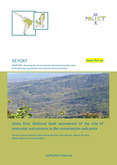| dc.contributor.author | Chacón Cascante, Adriana | es_ES |
| dc.contributor.author | Ibrahim, Muhammad Akbar | es_ES |
| dc.contributor.author | Ramos, Zayra | es_ES |
| dc.contributor.author | Vignola, Raffaele | es_ES |
| dc.contributor.author | Robalino, Juan | es_ES |
| dc.contributor.author | DeClerk, Fabrice A.J. | es_Es |
| dc.date.accessioned | 2015-11-18T06:02:01Z | |
| dc.date.available | 2015-11-18T06:02:01Z | |
| dc.date.issued | 2015-11-03 | es_ES |
| dc.identifier.uri | https://repositorio.catie.ac.cr/handle/11554/7741 | |
| dc.description.abstract | POLICYMIX aims to contribute to achieving the EUs goals of reversing trends in biodiversity loss beyond 2010 through the use of cost-effective and incentive compatible economic instruments. POLICYMIX focuses on the role of economic instruments in a mix of operational conservation policy instruments. The project includes seven case studies from six countries: Norway, Germany, Portugal, Finland, Brazil (Mato Grosso and Mata Atlantica) and Costa Rica. The present report discusses Costa Rican biodiversity goals and the main policies historically implemented to reach conservation objectives. The study first discusses national current biodiversity status and challenges; then an assessment of the existing economic instruments is presented to later analyze their roles in the policy mix for forest biodiversity conservation and ecosystem service provision. Instruments considered in the analysis are the national payment for ecosystem services program, protected areas, certification and law-enforced measures. | es |
| dc.description.sponsorship | Centro Agronómico Tropical de Investigación y Enseñanza (CATIE)-MAP | es |
| dc.language.iso | en | es |
| dc.relation.ispartof | Programa Agroambiental Mesoamericano (MAP). Fase I | |
| dc.title | Costa Rica: National level assessment of the role of economic instruments in the conservation policymix | es |
| dc.type | Libro | es_ES |
| dcterms.rights | Acceso abierto | |


